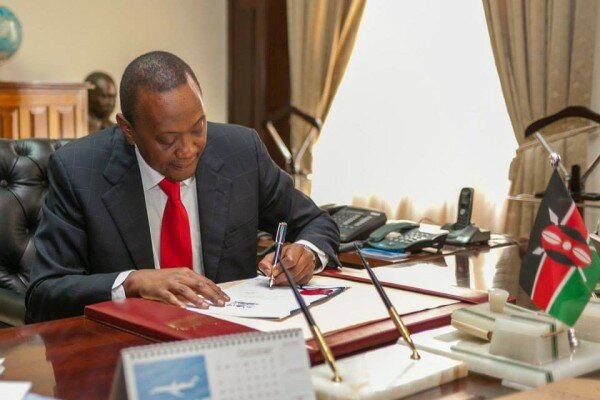
Image Courtersy of PSCU
Kenya’s President Uhuru Kenyatta has declined to assent to the Kenya Information and Communication (Amendment) (KICA) Bill 2013, which seeks to enforce hefty fines for journalists and media houses violating the Journalism Code of Conduct.
It is the first time Kenyatta has used his veto power to reject a bill sent to him by the National Assembly since he was sworn in as president in April 2013.
The President said many provisions of the bill go against the constitutional requirement that the tribunal proposed should be independent of commercial, political and government interests.
Kenyatta said the membership of the selection panel as set out under the proposed provision is drawn exclusively from media players and the government.
This, he said, is against the constitution that says the tribunal should be free of media, commercial and government interests.
According to Clause 37 of KICA, it proposes the introduction of a new section 102 (3), which provides for the establishment of the Communication and Multimedia Appeals Tribunal.
Subsection (3) sets out the membership of the selection panel responsible for appointing members of the tribunal.
On the removal of members of the tribunal, Kenyatta said subjecting them to a process that is steered by a panel comprising media and government would “render the process partial and lacking in independence”.
On the complaints the tribunal was set to handle, he said the jurisdiction of the tribunal is confined to complaints relating to the media enterprises and journalists.
“It does not deal with any matters relating to telecommunications, courier or postal services, information, communication and technology and other matters which fall within the ambit of the Act,” Kenyatta said.
According to the proposal for the procedure of the appointment of the members of the Board of the Communication Authority of Kenya, Kenyatta said the proposed section, as currently provided, may be construed to be contrary to Article 34 (3) (b) of the constitution that provides for media freedom.
The media bill proposed that the cabinet secretary will shortlist applicants, vetting of the shortlisted applicants by the National Assembly and the subsequent appointment of the chairperson and members of the board by the President.
Article 34 of the current constitution provides for a media that is independent of control by the government and political and commercial interests.
Kenyatta said these subsections may be viewed as curtailing the independence of the media as guaranteed by the Constitution for vesting the removal of the board members on the National Assembly.
Other clauses cited by the President to have contravened Article 34 include clauses 17, 37, 38 and clause 41.
Clause 17 proposes to amend section 461 of the act that sets the minimum local content in programming, which a broadcaster should air on radio or television.


















